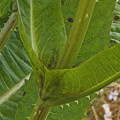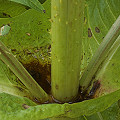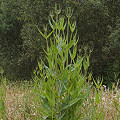Q: What is the genus Dipsacus like?
A: Dipsacus is a genus of about 15 species from Europe, Asia, and Africa.
The genus name derives from a Greek word for
thirst, which notes the fact that the leaves are often joined together at the stem (i.e. they are
perfoliate) in such a way as to create receptacles that fill with fluid--presumably dew and rainwater.
I am only familiar with Dipsacus fullonum--which I have encountered in the USA as a non-native weed.
(It is likely I have seen other species too, but just called them
D. fullonum in a display of reprehensible botanical laziness.) I must admit that the
perfoliate leaves make extraordinary, water-retentive structures. What is more, these water-filled leaf axils often include dead
and rotting insects and other invertebrates. Very strange. I wonder, if someone were to test these plants more carefully for
carnivorous behavior, what the results would be. Radio-isotope testing, anyone?
This is a distinctive genus--there is nothing else like it, at least in the USA. If you see a plant that looks like it growing on
the roadside, I can not think of anything else it might be. The fruiting stalks
are retained through the death of the plant; the dark and elliptical stalk-heads are easily seen among roadside weeds.
Page citations: Hickman (ed.) 1993; Schnell 2002a; personal observations.


